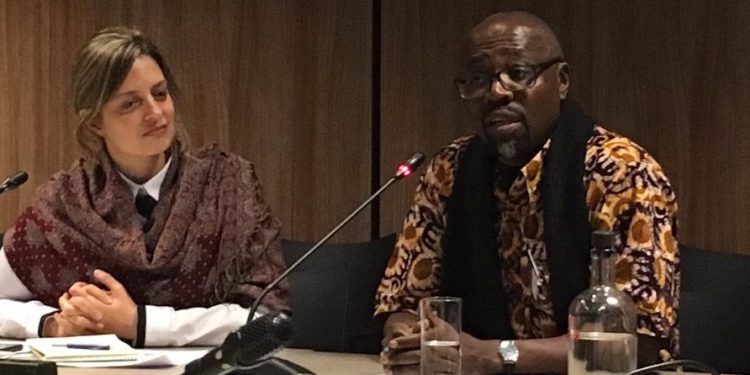The ICC seen through African eyes
Dozens of civil society representatives, diplomats, academic observers, an ICC judge and other court staff attended the official opening of “Commemorating 20 years of the Rome Statute in Africa seen through cartoons”.
The exhibition, which was organized by Journalists For Justice (JFJ) and co-sponsored by the British Embassy, continues to run on the sidelines of the 17th Assembly of States Parties at the World Forum in The Hague.
It features cartoons about cases at the ICC and the politics around them from various “situation countries” the court deals with, such as Kenya, Cote d’Ivoire and the Democratic Republic of Congo.
Featured cartoonist Godfrey Mwampembwa, known as Gado, a Tanzanian editorial cartoonist who has been living and working in Nairobi for many years, spoke about his experiences from caricaturing ICC issues. In his work, that comprises more than 100 ICC-related cartoons, he “touches on sensitive issues’’ that the “normal editorial content” of newspapers cannot dwell on.
He finds it very important that his cartoons on Uhuru Kenyatta and William Ruto, Kenya’s two top leaders who were charged at the ICC before their cases were terminated, have “enriched the discussion” on international criminal justice.
For his work, Gado has been harassed – “kicked out of my job at the Daily Nation because of political pressure”. He had drawn a Kenyatta and Ruto in ball and chains, a caricature he has been under pressure for once the suspect became president. Still he considers Nairobi a “safe haven” when he compares his situation to that of colleagues in Rwanda, where editorial cartooning has been criminalized, or in Tanzania, where colleagues have disappeared. “In many other African countries there is not that freedom.”
Gado pleads the case of the PEV victims after the end of the Ruto trial, who is shown in one cartoon dancing on their graves. This, according to Gado, “is relevant up to today: the victims and IDPs are completely forgotten”.
He has been struggling over the years with his editors, is still in litigation over his dismissal, and uses the Internet as an outlet where he can publish freely. To get new ideas for his drawings (up to 6 a day), he talks to lots of relevant actors, especially in from civil society.
The exhibition is continuing outside the Europe rooms in the corridors of the World Forum Convention Centre in The Hague, where the 17th session of the Assembly of States Parties to the Rome Statute takes place. Many visitors enjoyed the cartoons. Critics, especially from the Kenya government who did not enjoy the cartoons were admonished by others to receive them with sense of humour.
JFJ intends display the cartoons in exhibitions in various African capitals.







